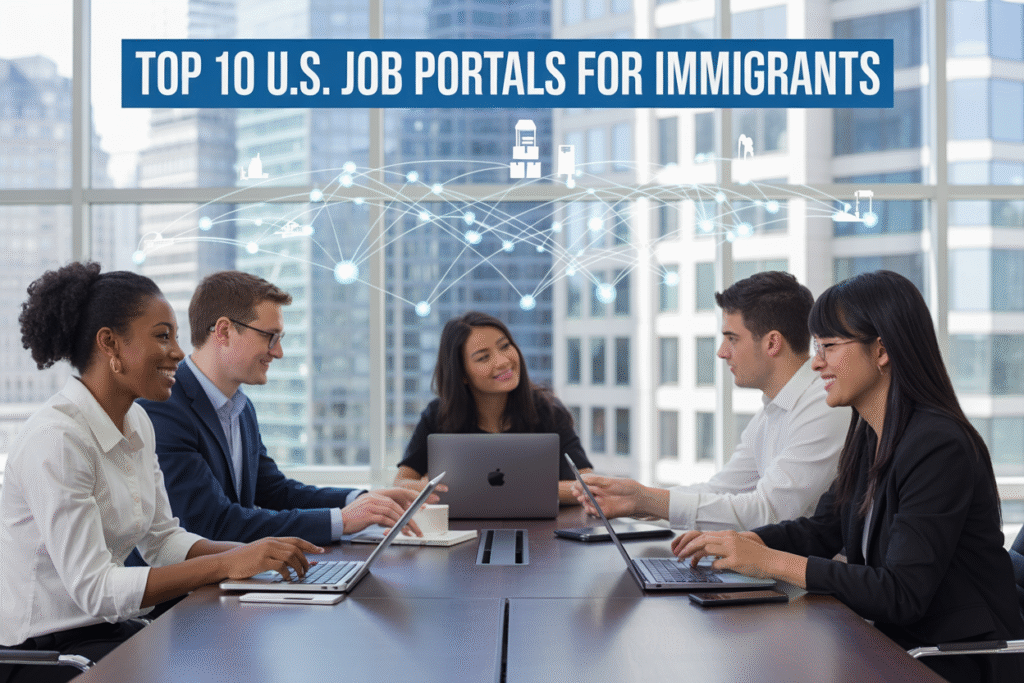Finding work in America as an immigrant can feel overwhelming, but the right job portals and networking strategies can fast-track your career success. This guide targets recent immigrants, international students transitioning to the workforce, and established immigrants seeking better opportunities who want to navigate the US job market effectively.
We’ll walk you through the top 10 US job portals for immigrants that connect you with employers who value diverse talent and international experience. You’ll discover how to build professional networks from scratch, even when you’re new to American workplace culture. We’ll also share proven networking for immigrants techniques that help you tap into the hidden job market where many positions never get posted online.
From general platforms like LinkedIn and Indeed to specialized immigrant career resources, you’ll learn which job search platforms America offers work best for your situation. We’ll cover industry-specific sites, government resources, and how to overcome common challenges like getting your international credentials recognized.
By the end, you’ll have a clear roadmap for using these tools to land interviews and build lasting professional relationships in your new home country.
Essential Preparation Before Using Job Portals

Optimize Your Resume for U.S. Hiring Standards
Your international resume needs a complete makeover for the American job market. Start by switching to the standard U.S. format: contact information at the top, followed by a professional summary, work experience in reverse chronological order, education, and skills. Keep it to one or two pages maximum.
Remove personal details that are common elsewhere but inappropriate in the U.S., such as photos, age, marital status, or nationality. These can lead to unconscious bias and are not expected by American employers. Focus instead on quantifiable achievements using action verbs and specific metrics. Replace “Responsible for managing team” with “Led 15-person team to achieve 25% increase in quarterly sales.”
Use American English spelling and terminology throughout. Change “CV” to “resume,” “post” to “position,” and “mobile” to “phone.” Match your job titles to U.S. equivalents when possible – “Managing Director” might translate better as “General Manager” depending on your actual responsibilities.
Tailor each resume to specific job postings by incorporating relevant keywords from the job description. Many US job portals for immigrants and major employers use Applicant Tracking Systems (ATS) that screen resumes based on keyword matches before human reviewers see them.
Translate and Verify International Credentials
Getting your international qualifications recognized in the U.S. requires careful planning and official documentation. Start by having your diplomas and transcripts professionally translated by certified translation services. Keep both original documents and certified translations readily available.
For regulated professions like healthcare, engineering, or teaching, contact the relevant licensing boards in your target state early in your job search process. Each state has different requirements, and some professions require additional exams or coursework. The National Association of Credential Evaluation Services (NACES) provides a list of approved credential evaluation agencies.
Research whether your professional certifications have U.S. equivalents or if you need additional training. Many immigrants discover that their years of experience matter more than formal credentials in certain industries. Document your professional achievements, projects, and responsibilities thoroughly to compensate for any credential gaps.
Consider pursuing additional certifications or training programs that are highly valued in your field within the U.S. market. Online platforms like Coursera, Udemy, and LinkedIn Learning offer courses that can bridge knowledge gaps and demonstrate your commitment to adapting to American business practices.
Research Visa Requirements and Work Authorization Status
Understanding your work authorization status is crucial before applying to jobs through US employment websites. Different visa types come with varying restrictions and requirements that affect your job search strategy.
If you’re on an H-1B visa, you’re tied to your sponsoring employer but can apply for extensions or transfers. F-1 students can work through Optional Practical Training (OPT) or Curricular Practical Training (CPT) programs. Green card holders have unrestricted work authorization, while asylum seekers need Employment Authorization Documents (EAD).
Create a clear, one-sentence explanation of your work status that you can easily communicate to potential employers. Practice phrases like “I’m authorized to work in the U.S. through 2025 under my H-1B visa” or “I have permanent work authorization as a green card holder.”
Research which employers in your field regularly sponsor work visas. Large corporations, universities, and hospitals are more likely to have established visa sponsorship programs. Some immigrant job search tips suggest focusing your efforts on these employers if you need sponsorship, as they understand the process and associated costs.
Keep all your immigration documents organized and easily accessible. Employers may request proof of work authorization quickly, and having everything ready demonstrates professionalism and preparedness.
Build a Professional Online Presence
Your digital footprint plays a major role in modern job searches, especially for professional networking immigrants. Start with LinkedIn, which is essential for career development immigrants in the U.S. market. Create a comprehensive profile with a professional headshot, compelling headline, and detailed work history that mirrors your resume.
Write a LinkedIn summary that tells your professional story while highlighting your unique perspective as an immigrant. Mention your language skills, international experience, and cultural adaptability as strengths. Join industry-specific groups and engage with content by commenting thoughtfully on posts and sharing relevant articles.
Clean up your other social media accounts, making sure your Facebook, Twitter, and Instagram profiles present you professionally. Many employers conduct informal background checks through social media, so remove any content that might raise red flags.
Consider creating a professional website or portfolio, especially if you’re in creative fields, technology, or consulting. This gives you a platform to showcase your work, share your professional journey, and demonstrate your expertise. Include testimonials, case studies, and examples of your work that highlight your value to potential employers.
Start building your network before you need it. Reach out to alumni from your university, connect with professionals in your field, and engage with immigrant professional organizations. The immigrant job market often relies heavily on referrals and networking, making these connections invaluable for long-term success.
Top General Job Search Platforms

Indeed – Maximum job listing coverage
Indeed stands as America’s largest job search engine, processing over 350 million unique visitors monthly and hosting millions of active job postings. For immigrants navigating the US job market, Indeed offers unparalleled breadth with listings spanning every industry, experience level, and geographic location across the country.
The platform’s strength lies in its aggregation model, pulling job postings from company websites, staffing agencies, and other job boards into one searchable database. This comprehensive approach means you’ll find opportunities that might be scattered across dozens of other sites. The advanced search filters allow you to narrow results by salary range, company size, job type, and even specific visa sponsorship requirements – a critical feature for immigrants needing employer support.
Indeed’s resume builder and application tracking system streamline the job hunting process. You can apply to multiple positions with saved information and track application status in real-time. The salary insights tool provides market data to help negotiate fair compensation, while company reviews offer insider perspectives on workplace culture and immigrant-friendliness.
The mobile app ensures you never miss opportunities, with push notifications for new matches and the ability to apply on-the-go. For recent immigrants, Indeed’s career guide section provides valuable resources on resume writing, interview preparation, and understanding American workplace norms.
LinkedIn Jobs – Professional networking integration
LinkedIn Jobs transforms traditional job searching by combining opportunities with powerful professional networking capabilities. With over 900 million global users and 20 million job postings, this platform serves as both a career marketplace and relationship-building hub – essential for immigrants establishing professional connections in a new country.
The platform’s unique advantage lies in its ability to show mutual connections at target companies, providing warm introduction pathways that can significantly boost application success rates. The “People You May Know” feature helps immigrants connect with professionals in their field, including fellow immigrants who can offer valuable insights and mentorship.
LinkedIn’s algorithm learns from your profile, activity, and preferences to surface relevant opportunities. The “Easy Apply” feature streamlines applications, while premium features like InMail credits allow direct outreach to hiring managers and recruiters. For immigrants, this direct communication channel can help address visa status questions upfront and demonstrate cultural fit.
The platform’s learning hub offers courses and certifications that can help bridge skill gaps or demonstrate commitment to American business practices. Industry-specific content and thought leadership articles keep users informed about market trends and help build professional credibility through engagement and sharing.
Profile optimization tools guide users in creating compelling professional narratives, while endorsements and recommendations provide social proof of capabilities – particularly valuable for immigrants whose educational and professional backgrounds might be unfamiliar to US employers.
Glassdoor – Company insights and salary transparency
Glassdoor revolutionizes job searching by providing unprecedented transparency into company culture, compensation, and employee experiences. For immigrants unfamiliar with American workplace dynamics, this insider perspective proves invaluable in making informed career decisions and avoiding potential cultural mismatches.
The platform’s comprehensive company profiles include salary ranges for specific roles, interview questions and processes, CEO approval ratings, and detailed employee reviews covering everything from work-life balance to diversity and inclusion practices. This information helps immigrants identify employers who actively support international talent and maintain inclusive workplace cultures.
Glassdoor’s salary transparency tools allow users to compare compensation across companies, locations, and experience levels. This data becomes crucial for immigrants who may lack market knowledge for salary negotiations. The platform’s “Know Your Worth” tool provides personalized salary estimates based on your background, helping ensure fair compensation discussions.
The interview insights feature offers real candidate experiences, including specific questions asked and assessment methods used. This preparation resource helps immigrants understand American interview culture and expectations, from behavioral questions to case study presentations.
Company ratings and reviews often highlight visa sponsorship policies, international employee support systems, and cultural adaptation resources. Reading experiences from other immigrants within target companies provides realistic expectations and helps identify potential champions within organizations.
ZipRecruiter – Quick application process
ZipRecruiter streamlines the job search experience with its one-click application system and AI-powered matching technology. For busy immigrants juggling job searches with other settlement priorities, this platform offers efficiency without sacrificing opportunity quality.
The platform’s smart matching algorithm analyzes your resume and preferences to automatically surface relevant positions, sending personalized job alerts throughout the day. This proactive approach means opportunities come to you, reducing time spent manually searching through listings. The mobile-first design ensures you can respond to opportunities immediately, often giving you an advantage over slower applicants.
ZipRecruiter’s Quick Apply feature eliminates repetitive form filling by using your stored profile information across applications. This efficiency allows you to apply to more positions in less time, increasing your chances of landing interviews. The platform also provides real-time feedback on application views and responses, helping you gauge market interest.
For immigrants, ZipRecruiter’s emphasis on skills-based matching can help overcome potential biases related to unfamiliar educational institutions or work experience gaps. The platform focuses on what you can do rather than where you’ve been, potentially opening doors to employers who might overlook your application on traditional keyword-based systems.
The salary insights and market data help immigrants understand compensation expectations, while the platform’s direct employer relationships often lead to faster response times and clearer communication about visa requirements and sponsorship availability.
Specialized Job Portals for Skilled Professionals

AngelList – Startup and tech opportunities
AngelList stands out as a premier platform connecting skilled immigrants with innovative startup companies and established tech giants. This specialized portal focuses exclusively on companies that value talent over traditional credentials, making it an excellent choice for immigrants looking to break into the US job market.
The platform showcases thousands of startup positions across engineering, product management, marketing, and business development roles. What makes AngelList particularly valuable for immigrants is its emphasis on skills-based hiring rather than extensive local experience. Many startups actively seek diverse talent and are often more willing to sponsor work visas or hire immigrants with strong technical backgrounds.
Key features include detailed company profiles that show funding stages, team size, and company culture. You can filter jobs by visa sponsorship availability, equity compensation, and remote work options. The platform also provides salary transparency, helping immigrants understand market rates for their skills.
To maximize success on AngelList, create a compelling profile highlighting your technical achievements and international experience. Many successful immigrants have leveraged this platform to land roles at companies like Stripe, Airbnb, and countless emerging startups that value global perspectives.
Dice – Technology and IT positions
Dice remains the go-to destination for technology professionals seeking positions across the United States. For immigrants with IT backgrounds, this platform offers unmatched access to technical roles spanning software development, cybersecurity, data analysis, and infrastructure management.
The platform excels at matching technical skills with specific job requirements. You can search using precise technology keywords like Python, AWS, or Kubernetes, making it easier to find roles that align with your expertise. Dice also features contract and consulting opportunities, which can serve as stepping stones for immigrants looking to establish their careers while building local professional networks.
What sets Dice apart is its deep integration with technical recruiters who specialize in placing IT professionals. Many recruiters on the platform have experience working with immigrants and understand visa requirements and sponsorship processes. The platform’s salary tools provide market insights that help immigrants negotiate competitive compensation packages.
Regular users report success by keeping their profiles updated with current certifications and project experiences. The platform’s job alert system ensures you never miss relevant opportunities, while its career advice section offers valuable insights into US tech industry trends and hiring practices.
FlexJobs – Remote and flexible work options
FlexJobs has revolutionized job searching for professionals seeking work-life balance and location flexibility. For immigrants, especially those dealing with relocation challenges or family obligations, this platform opens doors to legitimate remote and flexible employment opportunities.
The platform screens every job posting to eliminate scams and low-quality positions, providing peace of mind for job seekers. You’ll find remote positions across industries including customer service, project management, writing, marketing, and software development. Many of these roles don’t require local presence, making them perfect for skilled immigrants who want to work for US companies while maintaining flexibility.
FlexJobs categorizes opportunities into remote, part-time, freelance, and flexible schedule positions. This variety allows immigrants to choose work arrangements that fit their current circumstances, whether they’re waiting for visa approvals, managing family responsibilities, or transitioning between career phases.
The platform’s career coaching services and resume review options provide additional value for immigrants navigating the US job market. Success stories from the FlexJobs community show numerous immigrants who’ve built successful careers starting with flexible positions that later led to full-time opportunities and career advancement.
| Platform | Best For | Key Advantage |
|---|---|---|
| AngelList | Tech/Startup roles | Skills-based hiring |
| Dice | IT professionals | Technical precision |
| FlexJobs | Remote work seekers | Verified opportunities |
Industry-Specific Job Platforms

Healthcare job boards for medical professionals
Medical professionals looking for opportunities in the US have access to specialized platforms that understand the unique requirements of healthcare careers. Doximity stands out as the leading professional network for physicians, offering job listings, career insights, and networking opportunities with over 80% of US doctors as members. The platform provides salary benchmarking tools and allows physicians to showcase their expertise while connecting with colleagues nationwide.
Health eCareers serves as a comprehensive resource for all healthcare professionals, from nurses and pharmacists to allied health workers. This US job portal for immigrants features positions across hospitals, clinics, and private practices, with detailed filters for visa sponsorship availability. The platform regularly hosts virtual career fairs specifically designed for international healthcare workers.
NursingJobs.com and AllNurses cater specifically to nursing professionals, offering thousands of positions from entry-level to specialized roles. These platforms provide valuable resources about licensing requirements for foreign-educated nurses and connect users with recruiters experienced in immigrant hiring.
PracticeMatch focuses on physician recruitment and offers extensive resources for international medical graduates (IMGs) seeking residency positions or attending physician roles. The platform includes detailed information about visa requirements and sponsors events where international physicians can network with potential employers.
Engineering and technical role platforms
Engineering professionals benefit from specialized platforms that understand technical skill requirements and visa considerations. Dice remains the premier destination for technology and engineering roles, featuring advanced search filters for visa sponsorship and remote work opportunities. The platform’s algorithm matches candidates with relevant positions based on technical skills and experience level.
IEEE Job Site provides opportunities specifically for electrical engineers, computer scientists, and other technical professionals. As the professional association’s official job board, it features positions from leading technology companies and research institutions that frequently sponsor international talent.
Stack Overflow Jobs (now part of Indeed) continues to serve developers and software engineers through Indeed’s enhanced technology section. The platform allows professionals to showcase their coding skills and connects them with employers actively seeking international talent.
AngelList (now Wellfound) specializes in startup and technology company positions, making it excellent for immigrants seeking innovative work environments. Many startups on the platform are more flexible with visa sponsorship and offer equity compensation packages.
Upwork and Toptal provide freelance and contract opportunities that can help engineers build US professional networks while working on their visa status. These platforms often serve as stepping stones to full-time employment.
Finance and accounting specialized sites
Financial professionals can leverage industry-specific platforms that understand regulatory requirements and certification needs. eFinancialCareers leads the market for investment banking, trading, and wealth management positions. The platform features detailed salary information and connects users with recruiters specializing in international finance talent.
Robert Half and Randstad operate comprehensive job boards for accounting and finance professionals, with dedicated sections for temporary and permanent placements. Both companies have extensive experience placing international candidates and provide guidance on credential evaluation processes.
AccountingJobs.com focuses specifically on accounting roles from entry-level bookkeeping to senior controller positions. The platform includes resources for understanding US accounting standards (GAAP) and professional certification requirements like CPA licensing.
FlexJobs offers numerous remote and flexible finance positions, which can be particularly valuable for immigrants building their professional networks. The platform screens all listings to ensure legitimacy and frequently features positions from companies known for hiring international talent.
Academic and research position portals
Academic professionals have access to specialized platforms designed for higher education and research careers. HigherEdJobs serves as the leading resource for university positions, from faculty roles to administrative positions. The platform provides detailed information about visa sponsorship policies for different institutions and includes resources about the J-1 and H-1B visa processes common in academia.
Chronicle of Higher Education offers both job listings and valuable career advice specifically for international academics. The platform features positions across all disciplines and provides insights into the US academic job market, including tenure-track expectations and application processes.
Academic Jobs Online specializes in faculty positions and postdoctoral opportunities across various disciplines. The platform allows detailed filtering by field of study and includes information about institutions’ histories with international hiring.
ResearchGate Jobs connects researchers with opportunities in both academic and industry settings. The platform’s networking features help international researchers build connections within their field before applying for positions.
PostdocJobs.com focuses specifically on postdoctoral research positions, which often serve as pathways for international PhD holders to establish themselves in the US research community. The platform includes visa guidance and connects users with institutions experienced in hiring international researchers.
Government and Non-Profit Employment Resources

USAJobs for Federal Government Positions
Federal employment through USAJobs.gov opens doors to stable careers with excellent benefits for immigrants. This platform serves as the central hub for all federal government positions, offering over 300,000 jobs annually across hundreds of agencies. Many federal positions don’t require U.S. citizenship, making them accessible to permanent residents and other eligible immigrants.
The application process differs significantly from private sector hiring. Each job posting includes detailed qualification requirements, and applications must follow strict formatting guidelines. The system uses a questionnaire-based screening process where your responses directly impact your ranking among candidates. Pay special attention to the “How You Will Be Evaluated” section, as this explains exactly what reviewers look for.
Popular immigrant-friendly federal careers include IT specialists, engineers, healthcare professionals, and administrative roles. Many agencies actively recruit diverse talent and offer pathways for career advancement. The General Schedule (GS) pay scale provides transparent salary information, and benefits typically include health insurance, retirement plans, and paid time off.
Create a comprehensive USAJobs profile highlighting your education credentials, work experience, and any security clearances. Upload multiple versions of your resume tailored to different job series. Set up saved searches with email alerts for positions matching your skills and location preferences.
State and Local Government Job Portals
State and local governments often provide more accessible entry points for immigrant professionals seeking public sector careers. Each state maintains its own job portal, with major cities and counties operating separate systems. These positions frequently offer competitive salaries, comprehensive benefits, and opportunities to serve diverse communities.
California’s CalCareers, Texas’s state job portal, and New York’s employment website represent some of the largest state systems, each posting thousands of opportunities monthly. City governments like Chicago, Houston, and Los Angeles maintain robust hiring programs for positions ranging from administrative support to specialized technical roles.
Requirements vary significantly between jurisdictions. Some positions require residency within specific geographic boundaries, while others welcome applications from qualified candidates regardless of location. Many state and local roles don’t require citizenship, though some public safety and administrative positions may have restrictions.
The application process typically involves civil service exams or merit-based selection procedures. These standardized processes help ensure fair consideration for all candidates, including immigrants who might face bias in private sector hiring. Study guides and practice tests are often available online.
Benefits packages at the state and local level frequently rival or exceed federal offerings. Many governments provide tuition assistance, professional development opportunities, and clear promotion pathways. Union representation is common, providing additional job security and advocacy.
Non-Profit Organization Career Centers
Non-profit organizations offer meaningful career opportunities while supporting immigrant job seekers through specialized resources and culturally sensitive hiring practices. Many non-profits actively seek diverse staff members who understand immigrant experiences and can connect with the communities they serve.
Major platforms include Idealist.org, which lists over 120,000 non-profit jobs annually, and VolunteerMatch, which helps transition volunteers into paid positions. GuideStar and Charity Navigator provide information about organizations’ financial health and mission focus, helping you identify stable employers aligned with your values.
Immigration-focused non-profits like local resettlement agencies, community development organizations, and advocacy groups often prefer hiring immigrants who bring lived experience to their work. These organizations understand visa requirements, cultural transitions, and professional challenges immigrants face.
Salary ranges in the non-profit sector vary widely. While some positions offer competitive compensation packages, others prioritize mission over monetary rewards. Research organizations thoroughly using platforms like GlassDoor to understand realistic salary expectations. Many non-profits offer flexible working arrangements, professional development stipends, and loan forgiveness programs.
Networking plays a crucial role in non-profit hiring. Attend sector-specific conferences, join professional associations like the Association of Fundraising Professionals, and participate in volunteer work to build connections. Board members often have extensive professional networks and can provide valuable referrals for qualified candidates.
Consider starting with contract or part-time positions to demonstrate your value and cultural fit. Many non-profits prefer promoting from within, making temporary roles potential pathways to permanent employment. Grant-funded positions, while sometimes temporary, can provide valuable experience and networking opportunities leading to long-term career advancement.
Building Professional Networks as an Immigrant

Join immigrant professional associations
Connecting with immigrant professional associations can transform your career journey in ways you might not expect. These organizations understand the unique challenges you face – from credential recognition to cultural adaptation – and offer targeted support that mainstream networking groups often can’t provide.
National organizations like the Society of Professional Hispanic Engineers (SHPE), National Society of Black Engineers (NSBE), or the Asian American Professionals Network create powerful platforms for professional networking immigrants. Many cities also have local chapters that host regular meetups, workshops, and job fairs specifically designed for immigrant professionals.
Industry-specific associations often maintain immigrant or international member committees. The American Medical Association has programs for international medical graduates, while engineering societies frequently offer mentorship programs pairing established professionals with newcomers.
These associations typically offer:
- Mentorship programs with professionals who’ve navigated similar paths
- Job referral networks and exclusive job postings
- Professional development workshops tailored to immigrant experiences
- Credential recognition guidance and continuing education opportunities
Attend industry meetups and conferences
Industry events provide unmatched opportunities to build relationships while staying current with your field. The key is choosing events strategically and preparing to make meaningful connections rather than just collecting business cards.
Tech meetups like those organized through Meetup.com or Eventbrite often welcome newcomers and create informal environments for networking. Many major cities host weekly or monthly gatherings for specific technologies, programming languages, or business sectors.
Professional conferences may seem expensive, but many offer discounted rates for new immigrants or recent graduates. Some conferences provide scholarship programs or volunteer opportunities that reduce costs while increasing networking opportunities. Working as a volunteer often gives you insider access to speakers and organizers.
Local business events hosted by chambers of commerce or business journals create opportunities to meet employers and established professionals in your area. These events often attract hiring managers and company decision-makers who can provide direct pathways to employment.
Before attending any event:
- Research attendee lists and speakers
- Prepare a 30-second introduction about yourself
- Set realistic goals (aim for 3-5 meaningful conversations per event)
- Follow up within 48 hours with new connections
Connect with alumni networks from your home country
Your educational background creates instant common ground with fellow alumni living in the US. These connections often prove invaluable because alumni understand your academic training and can vouch for the quality of education from your institution.
University alumni associations in major US cities frequently organize social and professional events. Alumni from prestigious international universities often maintain active networks that include established professionals willing to help recent arrivals. Many universities maintain online directories that help you locate alumni in your target city or industry.
Professional school networks can be particularly powerful if you attended business school, medical school, or technical institutes. These alumni often hold senior positions and actively recruit talent from their alma mater.
Online alumni communities through LinkedIn or dedicated platforms make it easier to connect across geographic boundaries. Search for alumni groups by combining your university name with your target city or industry. Many successful professionals enjoy mentoring fellow graduates and may offer job referrals or industry insights.
Building these relationships requires authentic engagement rather than immediate job requests. Share updates about your career transition, ask for advice about industry trends, or offer to meet for coffee to learn about their professional journey. This approach builds genuine relationships that can support your long-term career development immigrants goals.
Leveraging Social Media for Job Search Success

Optimize LinkedIn profile for U.S. employers
Your LinkedIn profile serves as your digital handshake with potential employers across America. Start by crafting a compelling headline that goes beyond just listing your job title – include keywords that US recruiters actually search for in your field. Instead of “Software Engineer,” try “Full-Stack Developer | React, Node.js | Building Scalable Web Applications.”
The summary section needs to tell your story while addressing the elephant in the room – your immigrant status. Turn it into an advantage by highlighting your multilingual abilities, cross-cultural perspective, and international experience. Use phrases like “bringing global insights to local challenges” or “combining international expertise with American innovation.”
Make sure your work experience clearly translates to the US market. If you worked at companies Americans haven’t heard of, briefly describe what they do and their market position. Include metrics whenever possible – US employers love numbers. “Increased sales by 25%” resonates much better than “responsible for sales improvement.”
Skills endorsements matter more than you think. Ask colleagues and connections to endorse your top skills, and return the favor. LinkedIn’s algorithm favors profiles with active engagement, so this mutual endorsement strategy boosts your visibility to US job portals for immigrants and recruiters.
Add a professional photo – it’s not optional in the American job market. Studies show profiles with photos receive 14 times more views than those without.
Use Twitter to follow industry leaders
Twitter transforms from a social platform into a powerful career tool when you know how to use it strategically. Start by following industry leaders, company executives, and thought leaders in your field. Their tweets often reveal insider insights about hiring trends, company culture, and upcoming opportunities that never make it to traditional job search platforms America.
Create lists to organize your follows: “Tech Leaders,” “Healthcare Innovators,” or “Finance Experts” depending on your industry. This keeps your feed focused and helps you stay current with industry conversations. Engage thoughtfully with their content – reply with insightful comments, share relevant articles, and participate in Twitter chats using industry hashtags.
Many recruiters use Twitter to scout talent, especially in tech and creative fields. When you consistently share valuable content and engage professionally, you position yourself as someone worth noticing. Tweet about industry trends, share articles with your perspective, and showcase projects you’re working on.
Don’t forget to optimize your Twitter bio with relevant keywords and a link to your LinkedIn profile. Many professionals overlook this, but your bio is often the first thing people see when you engage with their content.
The key is consistency without being overwhelming. Aim for 3-5 quality interactions daily rather than sporadic bursts of activity.
Join Facebook professional groups
Facebook groups offer unique networking opportunities that other platforms can’t match. The conversation style is more casual and personal, making it easier to build genuine relationships with other professionals. Search for groups specific to your industry, location, or immigrant status – many cities have “Professionals in [City Name]” groups that welcome newcomers.
Industry-specific groups are goldmines for immigrant job market insights. Members often share job postings before they appear on major job boards, discuss salary expectations, and offer advice about navigating workplace culture. Groups like “Software Developers Network” or “Healthcare Professionals USA” provide insider knowledge that’s invaluable for career development immigrants.
Don’t overlook immigrant-focused professional groups. These communities understand the unique challenges you face and often share resources specifically designed for networking for immigrants. Members frequently offer mentorship, resume reviews, and interview preparation help.
Active participation is crucial – join conversations, answer questions when you can help, and share relevant opportunities with others. The Facebook algorithm rewards engagement, so regular participation increases the visibility of your comments and posts.
Set up notifications for your most valuable groups so you don’t miss time-sensitive opportunities. Many job postings in these groups get filled quickly through referrals, making speed essential for immigrant career resources and job hunting immigrants success.
Maximizing Job Portal Effectiveness

Set up targeted job alerts and notifications
Getting the right job opportunities delivered straight to your inbox makes all the difference in your search success. Most US job portals for immigrants offer sophisticated alert systems that go beyond simple keyword matching. Start by creating multiple alerts with different combinations of job titles, locations, and salary ranges rather than one broad search.
Configure alerts for variations of your target role – if you’re a software engineer, set up separate alerts for “software developer,” “full-stack engineer,” and “application developer.” Many platforms allow you to specify experience levels, company sizes, and even work authorization requirements, which saves time filtering through irrelevant postings.
Set your notification frequency to daily or twice weekly rather than instant alerts. This prevents inbox overload while keeping you current with new opportunities. Save your most important searches and review the alert performance weekly – if certain keywords aren’t generating quality matches, refine them based on the language you see in actual job postings.
Customize applications for each opportunity
Cookie-cutter applications rarely work in today’s competitive job market. Each application needs tailoring that goes beyond changing the company name in your cover letter. Start by analyzing the job description thoroughly – identify the top 5-7 requirements and craft your application to address each one specifically.
Rearrange your resume sections to highlight the most relevant experience first. If a position emphasizes project management skills, move those accomplishments toward the top of your experience bullets. Use the same terminology the employer uses – if they mention “cross-functional collaboration,” use that exact phrase rather than “teamwork” in your materials.
Your cover letter should tell a story that connects your background to their specific needs. Reference the company’s recent news, mission, or challenges you’ve researched. This shows genuine interest beyond just wanting any job. For immigrant job search success, address any potential concerns upfront – mention your work authorization status clearly and highlight your unique perspectives as strengths.
Track application progress and follow up strategically
Organization separates successful job seekers from those who get lost in the application maze. Create a spreadsheet tracking company names, positions, application dates, contact information, and follow-up schedules. Include columns for application status updates and interview feedback to identify patterns in your search.
Follow up timing matters more than most people realize. Send a brief thank-you email within 24 hours after submitting an application if you have a contact name. If you haven’t heard back within the timeframe they specified (or two weeks if none was given), send one polite follow-up email reiterating your interest and asking about next steps.
LinkedIn offers powerful tracking opportunities – connect with hiring managers and recruiters after applying, but personalize your connection request. Mention the specific role and express genuine interest in learning more about the company culture. This approach works particularly well for networking for immigrants, as it demonstrates proactive communication skills valued by American employers.
Use keywords that match job descriptions
Keywords aren’t just about beating applicant tracking systems – they’re about speaking the same professional language as your potential employers. Job search platforms America-wide use increasingly sophisticated matching algorithms that prioritize semantic relevance over simple keyword density.
Study 10-15 job postings for your target role and note recurring terms, especially technical skills, soft skills, and industry jargon. Create a master list of these keywords and naturally incorporate them throughout your resume and cover letter. Don’t stuff keywords unnaturally – instead, use them in context when describing your actual experience and accomplishments.
Pay attention to how skills are phrased differently across industries. “Data analysis” might be called “business intelligence” in some companies or “analytics” in others. Technology terms evolve quickly – stay current with industry terminology through professional forums and recent job postings. Your keyword strategy should evolve as you learn more about how different companies describe similar roles and responsibilities.
Overcoming Common Job Search Challenges

Address Employment Gaps and International Experience
Employment gaps can feel like major roadblocks when searching for jobs in the US, but they’re more common than you think. Many immigrants face these gaps due to visa processing delays, credential transfers, or time needed to adapt to a new country. The key is framing these periods positively during your job search on US job portals for immigrants.
Start by creating a compelling narrative around your gap. Did you spend time learning English, obtaining US certifications, or volunteering? These activities demonstrate your commitment to professional growth. When filling out applications on immigrant job search platforms, use your cover letter to briefly explain the gap rather than leaving it unaddressed.
Your international experience is actually a valuable asset, not a limitation. Global perspectives are increasingly valued by US employers, especially in diverse markets. Highlight cross-cultural communication skills, adaptability, and unique problem-solving approaches you’ve developed. When describing your international roles, focus on measurable achievements and translate them into terms US employers understand.
Consider getting your foreign credentials evaluated by organizations like World Education Services (WES) or Educational Credential Evaluators (ECE). This adds credibility to your background and helps employers understand your qualifications. Many immigrant career resources recommend this step early in your job search process.
Navigate Cultural Differences in Interview Processes
American interview culture can differ significantly from other countries, and understanding these nuances dramatically improves your success rate. US interviews typically emphasize individual achievements, direct communication, and confidence in presenting your abilities.
Practice the “STAR method” (Situation, Task, Action, Result) for answering behavioral questions. This structured approach helps you tell compelling stories about your professional experiences. American employers expect specific examples rather than general statements about your skills.
Body language matters tremendously in US interviews. Maintain eye contact, offer a firm handshake, and sit up straight. These signals convey confidence and professionalism. If your cultural background emphasizes more reserved behavior, practice these gestures until they feel natural.
Research company culture before each interview. Many US companies have casual workplace environments, while others maintain formal structures. LinkedIn and company websites provide insights into their culture through employee posts and company updates.
Prepare thoughtful questions about the role, team dynamics, and company goals. American employers view this as a sign of genuine interest and critical thinking skills. Avoid asking about salary, benefits, or vacation time during initial interviews unless the employer brings these topics up first.
Handle Salary Negotiations as a Newcomer
Salary negotiations can intimidate anyone, but immigrants often face additional challenges due to unfamiliarity with US compensation standards and negotiation customs. Research becomes your most powerful tool in this process.
Use websites like Glassdoor, PayScale, and Salary.com to understand typical salary ranges for your role and location. Factor in your experience level, education, and any specialized skills you bring. Remember that salaries vary significantly between cities, with places like San Francisco and New York typically offering higher compensation but also higher living costs.
Don’t accept the first offer immediately, even if it seems fair. Most US employers expect some negotiation and often build flexibility into their initial offers. Express gratitude for the offer, then ask for 24-48 hours to consider it. This gives you time to research and prepare a counteroffer if needed.
When negotiating, focus on your value proposition rather than personal financial needs. Highlight specific skills, experiences, or achievements that justify higher compensation. If the base salary isn’t flexible, consider negotiating other benefits like additional vacation days, professional development funds, or flexible working arrangements.
Practice your negotiation conversation beforehand. Many networking for immigrants groups offer mock negotiation sessions where you can build confidence. Remember that professional networking immigrants connections can provide valuable insights into fair compensation ranges within your industry.
Consider the total compensation package, not just base salary. Health insurance, retirement contributions, and stock options can add significant value to your overall package. Some companies offer immigration support benefits, which can be particularly valuable for newcomers navigating visa processes.
Long-term Career Development Strategies

Pursue Additional Certifications and Training
Building a successful career in the US often requires staying ahead of industry trends and continuously upgrading your skills. Professional certifications serve as powerful tools for career development immigrants, especially when competing in a dynamic job market. Start by researching industry-standard certifications relevant to your field through professional associations and employer job descriptions.
Consider pursuing certifications from recognized organizations like CompTIA for IT professionals, PMP for project managers, or CPA for accounting professionals. Many certification programs offer online learning options, making them accessible regardless of your location or work schedule. Community colleges and universities also provide affordable continuing education programs that can enhance your credentials.
Look into government-funded training programs specifically designed for immigrants. Organizations like the International Rescue Committee and local workforce development boards often offer free or subsidized professional development courses. These programs typically align with local job market demands and provide valuable networking opportunities with other professionals.
Online platforms like Coursera, LinkedIn Learning, and Udemy offer industry-recognized certificates that employers value. Focus on emerging skills in your field, such as digital marketing analytics, cloud computing, or data analysis. Document your learning journey on your LinkedIn profile and resume to demonstrate your commitment to professional growth.
Find Mentors Within Your Industry
Mentorship plays a crucial role in navigating the American workplace culture and advancing your career. Effective mentors provide insider knowledge about industry practices, company cultures, and unwritten professional rules that might not be immediately obvious to newcomers.
Start your mentor search through professional associations related to your field. Many organizations have formal mentorship programs designed to connect experienced professionals with emerging talent. Attend industry conferences, seminars, and networking events where you can meet potential mentors naturally through shared professional interests.
Consider reaching out to professionals whose career paths inspire you on LinkedIn. Craft personalized messages explaining your background and specific areas where you’d value guidance. Many professionals are willing to share their experiences and offer advice, especially when approached respectfully and with specific questions.
Don’t limit yourself to formal mentorship arrangements. Informal mentoring relationships often develop through regular professional interactions, volunteering for industry projects, or participating in professional development workshops. Alumni networks from your educational institutions can also connect you with professionals who understand your background and challenges.
Remember that mentorship is a two-way relationship. Offer value to your mentors by sharing insights from your unique perspective, assisting with projects when possible, and maintaining regular communication about your progress and challenges.
Build Relationships with Recruiters and Hiring Managers
Developing strong relationships with recruiters and hiring managers creates a competitive advantage in your job search and long-term career development. These professionals have deep insights into job market trends, salary expectations, and company cultures that can guide your career decisions.
Start by identifying recruiters who specialize in your industry through US job portals for immigrants and professional networking platforms. Internal recruiters at companies you’re interested in and external recruiting agencies both offer valuable connections. Follow their activity on LinkedIn, engage with their posts, and participate in discussions they initiate.
Attend recruiting events and job fairs where you can meet these professionals face-to-face. Come prepared with your elevator pitch, updated resume, and thoughtful questions about their companies and hiring practices. Even if current openings don’t match your profile, these interactions help you stay on their radar for future opportunities.
Maintain regular contact with recruiters who have worked with you previously, even after successful placements. Share updates about your career progress, new skills you’ve acquired, and changes in your career goals. This ongoing relationship ensures they think of you when relevant opportunities arise.
Be genuine in your interactions and avoid treating recruiters solely as job-finding tools. Show interest in their expertise and industry knowledge. Many recruiters appreciate candidates who ask thoughtful questions about market conditions and career development strategies rather than just focusing on immediate job openings.

Finding work as an immigrant in the U.S. can feel overwhelming, but the right combination of job portals and networking strategies makes all the difference. From major platforms like LinkedIn and Indeed to specialized sites for skilled professionals, you now have a roadmap to navigate the American job market more effectively. Remember that government resources and non-profit organizations offer valuable support specifically designed for immigrants, so don’t overlook these hidden gems.
Success goes beyond just submitting applications online. Building genuine professional relationships, optimizing your social media presence, and developing long-term career strategies will set you apart from other candidates. Start with the platforms that match your industry and skill level, but don’t put all your eggs in one basket. Mix online applications with real networking, and stay persistent even when facing rejections. Your unique background and perspective are assets that the right employer will value – you just need to find them using the tools and techniques we’ve covered.






